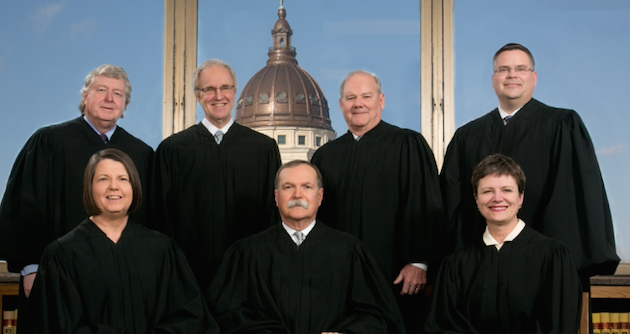Voters could replace bad judges on Kansas Supreme Court

What’s the real story about the retention of Supreme Court justices?
Ask a proponent of retaining the four ultra-liberal members of the Kansas Supreme Court that are up for a retention vote this November why there is so much animosity toward this group and they’ll tell you that the opposition simply wants to politicize the court because they disagree with its rulings. However, the simple truth is that the court is already heavily politicized and that those who disagree with the court’s rulings are in good company, given that the Supreme Court of the United States has repeatedly overruled the Kansas court, including the most recent ruling which rejected the Kansas Court’s reasoning in a scathing, almost unheard of, 8-1 ruling.
Currently justices are selected in the most elitist, anti-democratic process in the country, wherein the Supreme Court Nominating Commission is made up of only four non-lawyers appointed by the governor and a majority of five lawyers are elected only by other lawyers. That group then selects a panel of three “qualified” individuals to be sent to the governor. If the governor refuses to select one of the three, the chief justice of the Kansas Supreme Court selects one. The newly appointed justice then stands for retention during the next general election in a soviet style selection process in which they are the only candidate. They are then up for retention every six years thereafter. None have ever been rejected.
The Kansas Supreme Court continues to lose its cases before the U.S. Supreme Court
What makes the current system untenable is that the current liberal dominated court became highly (and brazenly) politicized on the issues of the death penalty, school finance and abortion, embracing politically orthodox, hard-left positions on all three in a state dominated by conservative elected officials.
“Indeed, SCOTUS has slapped the Kansas Supreme Court’s criminal decisions down the last six cases, every time for the last decade, and yet they continue to substitute their ideological positions over established law.”
Take for instance the death penalty. The Court has, in essence, tried to eliminate it de facto through endless delays and by overturning lower court decisions. For instance, the Court has given 27 ninety-day delays to the notorious Carr brothers (seven years of delays) and then overturned their death sentences when they did hear the case.
However, when their decision was appealed to the Supreme Court of the United States it was overturned in a scathing 8-1 decision that was signed off on by Justices from Antonin Scalia to Ruth Bader Ginsburg. Indeed, SCOTUS has slapped the Kansas Supreme Court’s criminal decisions down the last six cases, every time for the last decade, and yet they continue to substitute their ideological positions over established law.
From an ethical standpoint, the Court’s conduct on school finance places them in an even worse light. Currently, Kansans are spending over 50 percent of the state budget on K-12 education, $4.1 billion, and in a hearing just conducted the Court seemed to think that wasn’t enough. And yet school districts are able to shower largess on their administrative staff in the form of six-figure salaries with $1,000 per month car allowances, tax sheltered annuities and up to 40 days of vacation annually, in addition to double digit annual raises. Teachers, on the other hand are forced to continue to provide supplies for their own classrooms and make due with very modest increases in pay.
Here again, the make-up of the court goes a long way towards explaining the Court’s bias towards the educrats and teachers’ unions.
Dan Biles, up for retention in November, was an attorney for the state school board before moving onto the court and Chief Justice Lawton Nuss, also up for retention, was a plaintiffs’ attorney for the Salina School District in the original Montoy lawsuit, When Nuss moved to the court not only did he refuse to recuse himself from hearing the Montoy case, he was even caught holding ex parte meetings with key legislators. His actions resulted in an admonishment from the Commission on Judicial Qualifications. Only then did he recuse himself from that case. He is the only Justice subjected to a disciplinary process.
Kansans For Life will undoubtedly confront the Court on its record on the issue of abortion and so I won’t go into it in depth here. However, Carol Beiers appears to spearhead the Court’s efforts to intimidate prosecutors, like Phill Kline and his colleagues, from actively pursuing regulatory activities involving abortion providers. Her intemperate remarks directed at Kline during some of the hearings were so over the top that even one of her fellow female justices saw fit to comment on her unprofessional nature.
In essence, implied claims that Kansas courts are not currently politicized are false at all levels. Even at the District Court level judges like Kevin Moriarty in Johnson County and Franklin Theis in Shawnee County stand out for their far left judicial activism. This is a direct function of an elitist selection process dominated by liberal attorneys, themselves not selected by the voters, resulting in the imposition of a judiciary that is unrepresentative of the people of Kansas.
Several organizations have now been created to rid the courts of some of the worst ideological elements. The groups are largely non-partisan, some organized by the families of murder victims, to oppose the retention of the following justices and Appeals Court judges.
For the Supreme Court conservative organizations across the state recommend No votes for Lawton Nuss, Dan Biles, Carol Beiers and Marla Luckert. They recommend a Yes vote for Caleb Stegall. For the Apellate Court they recommend No votes for Steve Leben, G Joesph Pierron Jr., G. Gordon Atcheson and Karen Arnold-Burger and Yes votes for David E Bruns and Kathryn A. Gardner.
On the morning after the Nov. 8 election, we’ll see if anyone was paying attention.
– By John Altevogt








